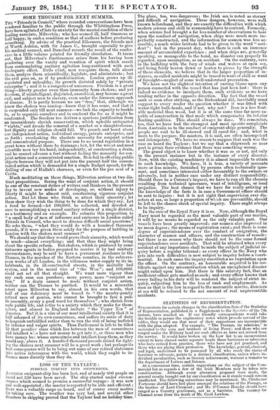SOME THOUGHT FOR NEXT SUMMER.
THE "Friends in Council," whose recorded conversations have been rendered familiar to the public through the Whittingham Press, have been agitated of late by anxiety for the mental condition of their leading associate, Milverton ; who has seemed ill, half timorous or half happy, in such a condition as that of authors before producing something. By advice of the practical Ellesmere, the friends met at Worth Ashton, with Sir James C., brought especially to give his medical counsel, and Dunsford records the result of the confer- ence in a little volume printed for friendly circulation. It turns out, that Milverton's fractiousness arises from his having been pondering over the vanity and vexation of spirit which result from contemplating sanitary agitation long-continued with such inadequate effect. Evils exist, men recognize them, talk about them, analyze them scientifically, legislate, and administrate ; but the evil goes on, as if by predestination. London grows up ill- regulated and unhealthy, its growth dictated solely by "private enterprise"; and it is a congeries of nuisances. Freedom is a great thing—liberty greater even than immunity from cholera ; and yet freedom, if unintelligent, disjointed, anarchical, may become a great evil, and subject men to slavery, even under the foreseen approach of disease. It is partly because we are "free," that, although we knew the cholera was coming—know that it has come, and that it is suspended only till next summer—we lack the capacity to buckle to, or to organize ourselves and to confront the foe as it might be confronted. The freedom too derives a spurious justification from an inconsiderate slavish conservatism, which upholds antiquated "rights," and dreads the removal of a market or a slaughterhouse, lest dignity and religion should fall. We preach and boast about our independent action, individual energy, private enterprise, and so forth ; overlooking the absolute necessity for conjoint action and concentrated purpose. There can be no sound regulation in a great town without there be drainage ; but, let the wisest and most scientific man try his hand, independently, at constructing a drain, and he cannot acivance a foot without feeling the necessity for con- joint action and a concentrated sanction. Men fail in effecting public objects because they will not put into the pursuit half the concen- trated action which is demanded for a single Budget speech, for the drilling of one of Hullah's choruses, or even for the pas seul of a Cerito.
Much meditating on these things, Milverton arrives at two dis- tinct propositions. Seeing the want of conjoint action, it should be one of the constant duties of writers and thinkers in the present day to invent new modes of developing, or, without injury to liberty it might be, almost said, constraining vigorous conjoint action. But let those who think so attest their sincerity ; let them show they wish the thing to be done for which they cry. Let a fund be formed—let 100,000/. be collected, and devoted at once to accomplishing a sound sanitary reform of a single district, as a testimony and an example. He submits this proposition to "a small body of men of influence and eminence in London called Friends in Council, who meet to discuss difficult social questions." He asks them, "what they would do with a hundred thousand pounds, if it were given them solely for the purpose of battling in London with the cholera next summer ?"
We should say that they would prove their sincerity, which would be much—almost everything; and that thus they might bring about the specific reform. But cholera, which is produced by some unknown agents in bodies prepared to receive it by bad sanitary circumstances, may be said to have a permanent residence in the Thames, in the marshes of the Eastern counties, in the subterra- nean works of all London, in the villanous water-supply to its in- habitants, in its ill-constructed streets, in the mortally bad system, and in the moral vice of "the Wen"; and 100,000/. could not set all that straight. Wo want more vigour than any such sum can purchase, more power, more "conjoint ac- tion." If a drain cannot be made without conjoint action, neither can the Thames be purified. It would be a miserable retort upon Milverton to say, almost in his own words, that half of our deficiency must be traced to "the namby-pamby retired men of genius, who cannot be brought to face a pub- lic assembly, orsay a good word for themselves " ; who shrink from rude public life, and retire to a society which they make for them- selves, and almost in England imitate "the Upper Ten" of America. 'Rut it is a vice of our most intellectual society that it is half ashamed of its own earnestness, and suffers its sense of duty to languish unfulfilled rather than to run the risk of being buffeted by inferior and vulgar spirits. Thus Parliament is left to be filled by that peculiar class which lies between the men of earnestness and intellect 'who have not money to get into it, or those men who have money but whose earnestness and intellect keep them, as they '!vould say, above it. A hundred thousand pounds raised for fight- ing the cholera next summer will be a great work ; but perhaps its hest consequence will be to bring out some of our retired statesmen into active intercourse with the world, which they ought to in- fluence more directly than they do.






























 Previous page
Previous page